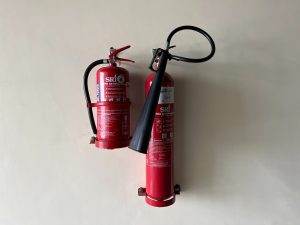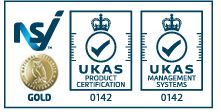
There are six different categories of fire extinguishers for businesses. The fire extinguisher that you need for your business is dependent on the materials present in your business and their risk of fire. Below we look at the types of fire extinguishers that may be required in your business premises.
First, we look at the different types of fire. There are 6 categories of fire involving different substances. These are as follows.
- Class A fires are combustible carbon-based solids fires. These will be made from materials such as paper, wood and textiles for example.
- Class B fires are created from flammable liquids. This includes things like paraffin, petrol, diesel or oil for example. However, a Class B fire material does not include cooking oil.
- Class C fires are made from flammable gases. These flammable gasses include things like butane, propane or methane.
- Class D fires are created from burning metals. These include things like aluminium, lithium or magnesium for example.
- Fire that are caused by electrical equipment are not known as Class E fires. Instead, they are indicated by an electrical symbol.
- Finally, Class F fires are caused by materials such as fats or cooking oils. This type of fire is more common in premises with kitchens.
When using fire extinguishers, it is important that the right type of fire extinguisher is used for the right type of fire. Below we have listed the types of fire extinguishers that can be used the quench the various types of fires as stated below.
- A Class A type of fire can be quenched with water, water mist, foam or dry powder. It could also be put out with a wet chemical fire extinguisher.
- The Class B fire can be quenched with a water mist, foam, dry powder, co2 or some wet chemical fire extinguishers.
- If you have a Class C fire this can only be put out with a water mist or dry powder fire extinguisher.
- A Class D fire will require a specialist dry powder fire extinguisher to quench it.
- An electrical fire will require some water mist, some foam and co2 to quench it.
- If you have a Class F fire it will require water mist and wet chemical to extinguish it.
These are the six categories of fire extinguishers. If you’re not sure of the right fire extinguisher for your business, call our team of experienced fire extinguisher engineers.

